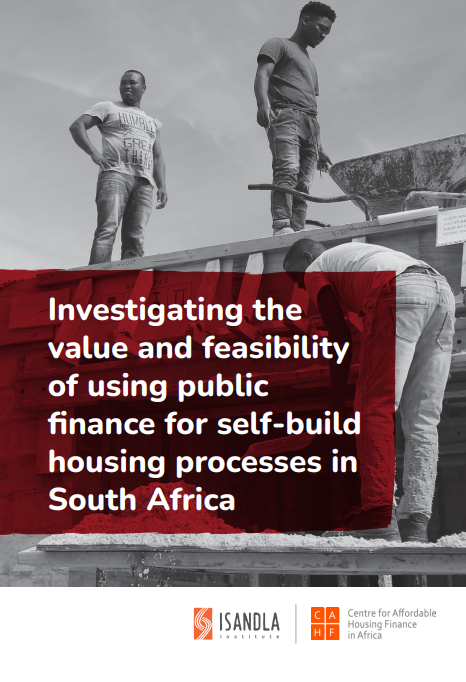Investigating the value and feasibility of using public finance for self-build housing processes in South Africa

02 October 2023
Centre for Affordable Housing Finance Africa, Isandla Institute
English
Isandla Institute Librarian, Alison Tshangana
Report
Centre for Affordable Housing Finance in Africa, Isandla Institute
Africa
This paper titled Investigating the value and feasibility of using public finance for self-build housing processes in South Africa (PDF, 2.19 MB) discusses housing subsidy programmes in South Africa, with a focus on the shift in policy emphasis from project-based top structure delivery programmes to the provision of serviced sites and rapid land release programmes. Traditionally, housing subsidy programmes prioritised volumes and products, often involving project-based top structure delivery. Meanwhile, assistance for households wishing to build their homes themselves were left to the Enhanced People’s Housing Process (EPHP) programme, which has been associated with extended project delays and complex, labour-intensive community engagement and facilitation.
Due to fiscal constraints and changing national housing sector policies, there is a move away from fully-subsidised housing delivery programmes. The new emphasis is on providing serviced sites and rapid land release programmes. However, the paper argues that merely providing serviced sites without financial and/or non-financial assistance for building does not align with the State’s constitutional obligations to provide access to adequate housing. Additionally, it may not effectively facilitate the creation of an appreciating capital asset for the household. In response to this policy shift, the paper explores the feasibility of self-build subsidies for low-income households. It examines this feasibility from policy, financial, and institutional perspectives, drawing upon research, detailed analysis of housing policy, and key informant interviews. The paper was developed in collaboration with the Isandla Institute as part of the Backyard Matters project. The goal is likely to provide insights and recommendations on how self-build subsidies can be integrated into the evolving housing policy landscape in South Africa, addressing the challenges and opportunities associated with the new approach to housing assistance.
Abstract based on original source.



Comments